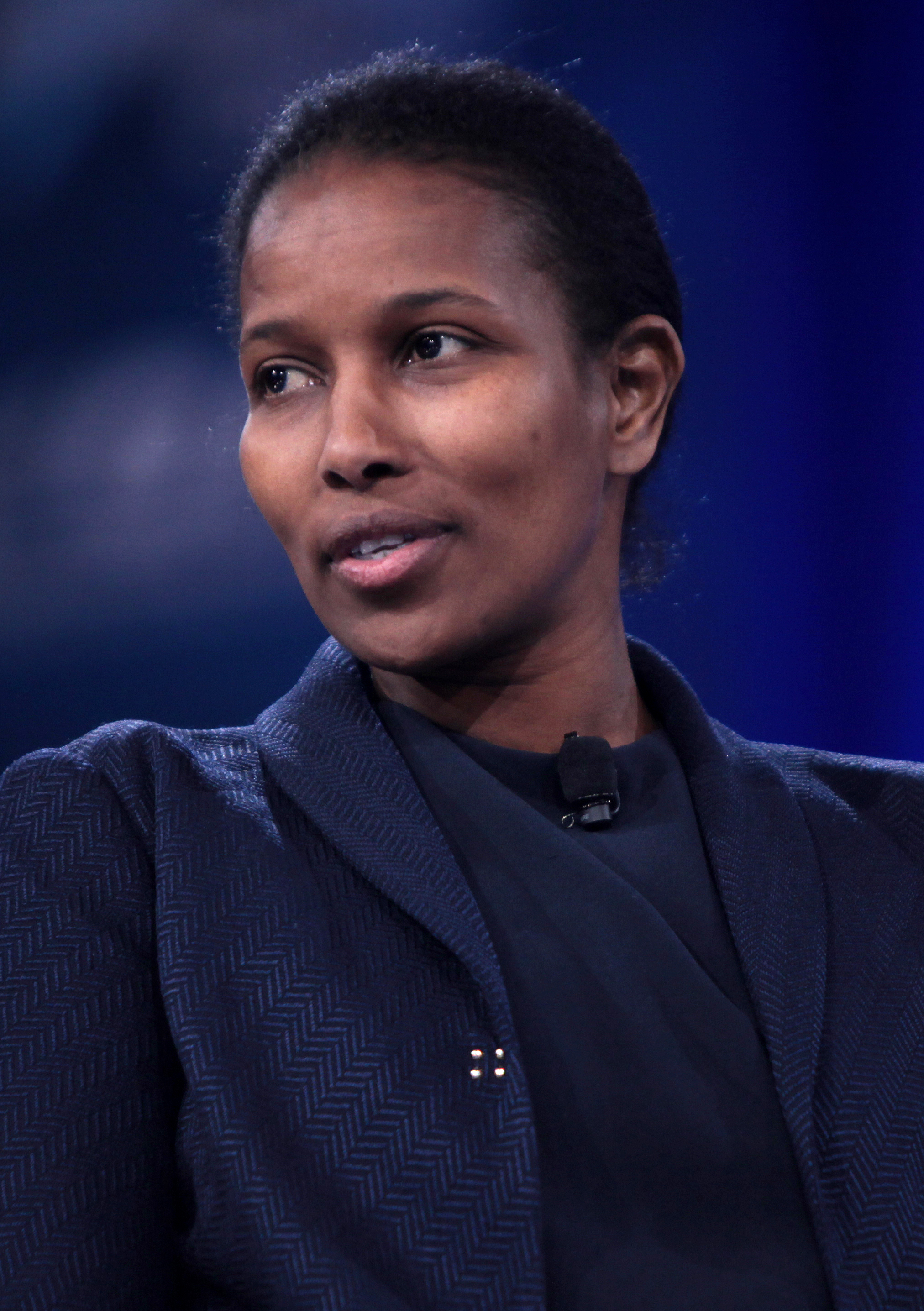Capítulo 3, Playing Tag in Allah's Palace (Desempeñar la etiqueta en el palacio de Alá), p. 41. Se refiere a las normas sociales vigentes durante su estancia en Arabia Saudí.
Infidel (2007)
Original: «With our grandmother staying behind in Somalia, my mother had nobody with whom to share tasks and plans. She could do nothing on her own. She wasn't supposed to go out on the street without these new guardians of ours, our uncles, and neither were we. To phone them she had to scuttle down to the corner grocer, with my ten-year-old brother in tow acting as her protective male.»
Frases célebres de Ayaan Hirsi Ali
Introducción, página XXII.
Infidel (2007)
Original: «People ask me if I have some kind of death wish, to keep saying the things I do. The answer is no: I would like to keep living. However, some things must be said, and there are times when silence becomes an accomplice to injustice.»
Original: «Never confuse Islamic Sharia and the Muslims who really mean it with those extremist Christians who live in the United States.»
Original: «Islam is not a religion of peace. It's a political theory of conquest that seeks domination by any means it can.»
Fuente: "Author, activist condemns Muslim faith at Palm Beach talk", Palm Beach Daily News (21 de marzo de 2009). http://web.archive.org/web/20090324042409/www.palmbeachpost.com/localnews/content/local_news/epaper/2009/03/21/0321muslimsali.html
Original: «Every accommodation of Muslim demands leads to a sense of euphoria and a conviction that Allah is on their side. They see every act of appeasement as an invitation to make fresh demands.»
Ayaan Hirsi Ali: Frases en inglés
Quoted in “Ayaan Hirsi Ali slams protesters who prevented her visit to Australia,” Emily Ritchie, The Australian, (April 5, 2017) https://www.theaustralian.com.au/news/nation/ayaan-hirsi-ali-hits-back-at-muslim-women-for-carrying-water-for-extremists/news-story/163a1a49c66d32a5501718d2984894ed
Hirsi Ali: "Never confuse Islamic Sharia and the Muslims who really mean it with those extremist Christians who live in the United States" http://www.jihadwatch.org/archives/2007/07/017367print.html, Jihad Watch, 13 July 2007
Ayaan Hirsi Ali in a video interview http://web.archive.org/web/20070703045949/http://www.cbc.ca/onthemap/fullpage.php?id=87, CBC News, 11 July 2007
A culture that celebrates femininity and considers women to be the masters of their own lives is better than a culture that mutilates girls' genitals and confines them behind walls and veils or flogs or stones them for falling in love. A culture that protects women's rights by law is better than a culture in which a man can lawfully have four wives at once and women are denied alimony and half their inheritance. A culture that appoints women to its supreme court is better than a culture that declares that the testimony of a woman is worth half that of a man.
Nomad: A Personal Journey Through the Clash of Civilizations (2010)
Epilogue: Letter to My Unborn Daughter (p. 273)
2010s, Nomad: A Personal Journey Through the Clash of Civilizations (2010)
Conclusion: The Miyé and the Magaalo (p. 261)
2010s, Nomad: A Personal Journey Through the Clash of Civilizations (2010)
“A mosque is an island of gender apartheid.”
Fuente: 2010s, Nomad: A Personal Journey Through the Clash of Civilizations (2010), Chapter 16, “Seeking God but Finding Allah” (p. 252)
“Contempt for women is inscribed in the works of Saint Paul.”
Fuente: 2010s, Nomad: A Personal Journey Through the Clash of Civilizations (2010), Chapter 16, “Seeking God but Finding Allah” (p. 241)
Fuente: 2010s, Nomad: A Personal Journey Through the Clash of Civilizations (2010), Chapter 15, “Dishonor, Death, and Feminists” (p. 235)
Fuente: 2010s, Nomad: A Personal Journey Through the Clash of Civilizations (2010), Chapter 15, “Dishonor, Death, and Feminists” (pp. 233-234)
Fuente: 2010s, Nomad: A Personal Journey Through the Clash of Civilizations (2010), Chapter 15, “Dishonor, Death, and Feminists” (p. 232)
Fuente: 2010s, Nomad: A Personal Journey Through the Clash of Civilizations (2010), Chapter 15, “Dishonor, Death, and Feminists” (p. 231)
Fuente: 2010s, Nomad: A Personal Journey Through the Clash of Civilizations (2010), Chapter 14, “Opening the Muslim Mind: An Enlightenment Mind” (p. 212)
Fuente: 2010s, Nomad: A Personal Journey Through the Clash of Civilizations (2010), Chapter 13, “Violence and the Closing of the Muslim Mind” (p. 191)
“In the madrassa, questions were not welcome; they were considered impertinent.”
Fuente: 2010s, Nomad: A Personal Journey Through the Clash of Civilizations (2010), Chapter 13, “Violence and the Closing of the Muslim Mind” (p. 186)
Fuente: 2010s, Nomad: A Personal Journey Through the Clash of Civilizations (2010), Chapter 11, “School and Sexuality” (p. 154)
Fuente: 2010s, Nomad: A Personal Journey Through the Clash of Civilizations (2010), Chapter 11, “School and Sexuality” (p. 152)
Fuente: 2010s, Nomad: A Personal Journey Through the Clash of Civilizations (2010), Chapter 10, “Islam in America” (p. 134)
Fuente: 2010s, Nomad: A Personal Journey Through the Clash of Civilizations (2010), Chapter 9, “America” (p. 113)
Fuente: 2010s, Nomad: A Personal Journey Through the Clash of Civilizations (2010), Chapter 6, “My Cousins” (p. 81)
Fuente: 2010s, Nomad: A Personal Journey Through the Clash of Civilizations (2010), Chapter 5, “My Brother’s Son” (p. 71)
Fuente: 2010s, Nomad: A Personal Journey Through the Clash of Civilizations (2010), Chapter 4, “My Brother’s Story” (p. 58)
Introduction (p. xiv)
2010s, Nomad: A Personal Journey Through the Clash of Civilizations (2010)
